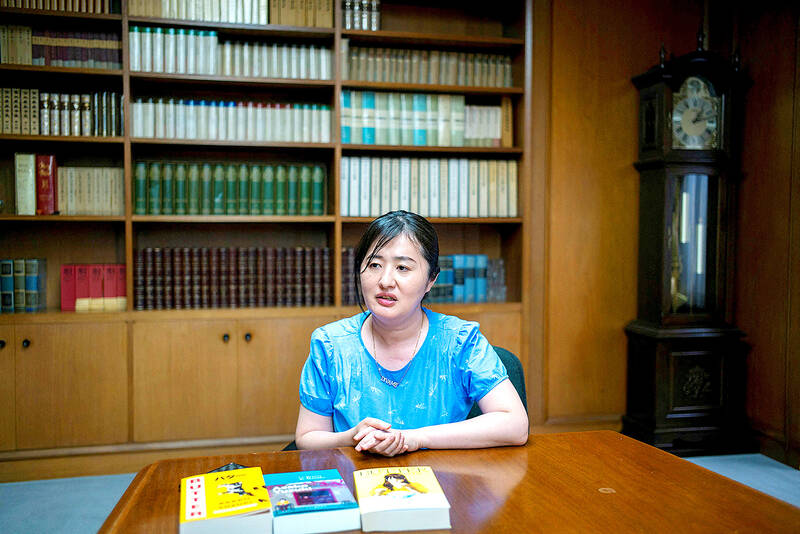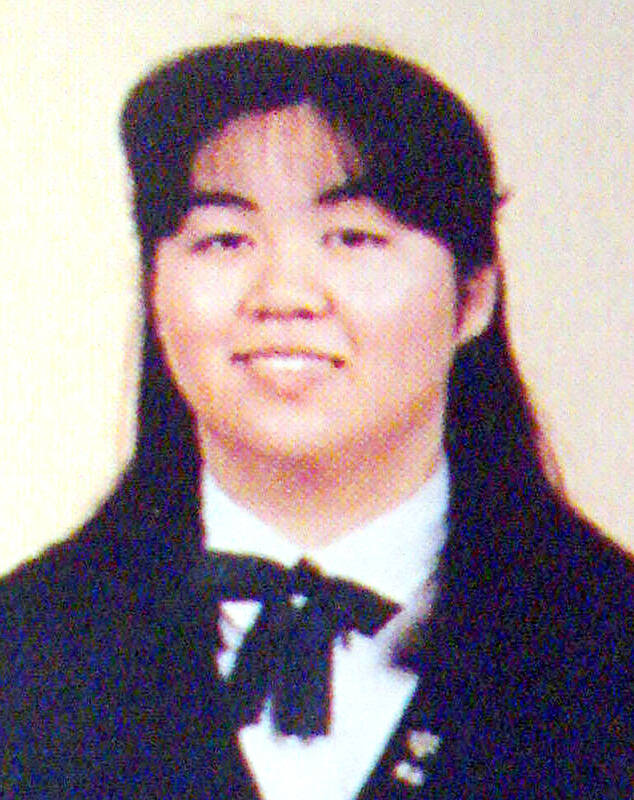Japanese writer Asako Yuzuki did not expect her novel Butter to capture a cult following abroad, hailed as a biting feminist critique of sexism and body-shaming.
Translated into English last year, the tale of murder and misogyny has whetted an insatiable appetite, selling 610,000 copies overseas, including 400,000 in Britain — more than Japan — where it won multiple awards.
Yuzuki was inspired by the real-life story of “Black Widow” Kanae Kijima, a woman sentenced to death in 2012 for poisoning three men she met on dating sites.

Photo: AFP
The sensationalized media coverage at the time largely focused on Kijima’s appearance, speculating how someone described as homely and unattractive could be considered a femme fatale.
Many credited her romantic success to her homemaking prowess — notably in the kitchen.
“When the case broke, the Japanese media mainly remembered that the suspect liked to cook and took classes ... to ‘please men,’” Yuzuki said.

Photo: AFP
“That deeply disturbed me.”
In Butter, a journalist likewise disquieted by the portrayal of a Kijima-like character (renamed Kajii) writes to the jailed suspect, hoping to secure an exclusive interview by appealing to her gourmet tastes.
Via a letter soliciting the beef stew recipe that Kajii reportedly fed her final victim, the pair begin an intimate and life-changing relationship.

Photo: AFP
This proves a vehicle for Yuzuki to chew over the roots of misogyny in Japan, where traditional male and female roles still dominate and women are held to impossible beauty standards.
In politics and boardrooms for example, women remain rare. Japan ranks 118 out of 146 in the World Economic Forum’s 2025 Gender Gap Report.
“Japan is a deeply patriarchal country. Very often, it is the father who occupies the central position within the family unit. This is the basis for laws even,” Yuzuki said.
‘FATPHOBIA’
Food — particularly butter, that artery-blocking symbol of pleasure and excess — forms the molten core of the story.
Through sumptuous descriptions of butter-rich ramen and lavishly buttered rice, Yuzuki explores the tension between indulging appetites and the self-denial required to fulfill the societal pressure on women to stay thin.
“There is an incredible amount of adverts for weight loss, cosmetic surgery and diets. This country is obsessed with fatphobia,” Yuzuki said.
It is also tough for women in Japan, where the #MeToo movement never really took off, to speak out about discrimination and sexual assault.
Shiori Ito, a journalist who took the rare step of publicly accusing a prominent Japanese TV reporter of rape — a charge he denies — is a case in point.
Ito’s documentary Black Box Diaries, which was nominated for an Oscar, was not released in Japan because it used material recorded clandestinely or intended for judicial use only.
“In other countries, especially the United States, from the beginning of #MeToo, many well-known journalists have seriously investigated these cases, and it is because this information was made public officially that the victims were able to be protected,” Yuzuki said.
But in Japan, “women who have had the courage to speak out are reduced to the role of activists and consumed by the media within that framework,” she said.
Another example is Masahiro Nakai, a boyband member and a star TV presenter accused of sexual assault. He initially disputed the facts and then apologized.
The scandal shone a spotlight on the toxic culture of young women being pressed into attending dinners and drinking parties with powerful figures.
“What strikes me is this uninterrupted chain of sexual violence, and especially that these are crimes committed within one organization, covered up by another organization... that of the media,” Yuzuki said.
Yuzuki is convinced that change can only come from outside.
“When foreigners take up a topic, especially the English-language media, it completely changes the way it is perceived in Japan,” she said. “If the European media” continue to be interested in these issues, then “the situation could perhaps change a little.”

Towering high above Taiwan’s capital city at 508 meters, Taipei 101 dominates the skyline. The earthquake-proof skyscraper of steel and glass has captured the imagination of professional rock climber Alex Honnold for more than a decade. Tomorrow morning, he will climb it in his signature free solo style — without ropes or protective equipment. And Netflix will broadcast it — live. The event’s announcement has drawn both excitement and trepidation, as well as some concerns over the ethical implications of attempting such a high-risk endeavor on live broadcast. Many have questioned Honnold’s desire to continues his free-solo climbs now that he’s a

As Taiwan’s second most populous city, Taichung looms large in the electoral map. Taiwanese political commentators describe it — along with neighboring Changhua County — as Taiwan’s “swing states” (搖擺州), which is a curious direct borrowing from American election terminology. In the early post-Martial Law era, Taichung was referred to as a “desert of democracy” because while the Democratic Progressive Party (DPP) was winning elections in the north and south, Taichung remained staunchly loyal to the Chinese Nationalist Party (KMT). That changed over time, but in both Changhua and Taichung, the DPP still suffers from a “one-term curse,” with the

Jan. 26 to Feb. 1 Nearly 90 years after it was last recorded, the Basay language was taught in a classroom for the first time in September last year. Over the following three months, students learned its sounds along with the customs and folktales of the Ketagalan people, who once spoke it across northern Taiwan. Although each Ketagalan settlement had its own language, Basay functioned as a common trade language. By the late 19th century, it had largely fallen out of daily use as speakers shifted to Hoklo (commonly known as Taiwanese), surviving only in fragments remembered by the elderly. In

Lines between cop and criminal get murky in Joe Carnahan’s The Rip, a crime thriller set across one foggy Miami night, starring Matt Damon and Ben Affleck. Damon and Affleck, of course, are so closely associated with Boston — most recently they produced the 2024 heist movie The Instigators there — that a detour to South Florida puts them, a little awkwardly, in an entirely different movie landscape. This is Miami Vice territory or Elmore Leonard Land, not Southie or The Town. In The Rip, they play Miami narcotics officers who come upon a cartel stash house that Lt. Dane Dumars (Damon)